 Abraham Lincoln
If given the truth, the people can be depended upon to meet any national crisis...
Abraham Lincoln
If given the truth, the people can be depended upon to meet any national crisis...
 Guildford news...
for Guildford people, brought to you by Guildford reporters - Guildford's own news service
Guildford news...
for Guildford people, brought to you by Guildford reporters - Guildford's own news service
Billy Graham, My Family and Memories of Westborough’s Church Community
Published on: 5 Dec, 2020
Updated on: 5 Dec, 2020
David Reading, reporter for The Guildford Dragon NEWS, has written a 40,000-word book on his lifelong search for an understanding of religious truth – starting with his attendance at St Francis’ Church, Beckingham Road, Guildford. Here, we publish an extract from that book dealing with his time living in a tiny four-room house in Midleton Road, opposite the Dennis Brothers factory where his dad worked.
Wembley Stadium, the spring of 1954: A time of religious revival. The 35-year-old American evangelist William Franklin Graham Junior – known to the world as Billy – was visiting Britain for his 12-week Greater London Crusade.
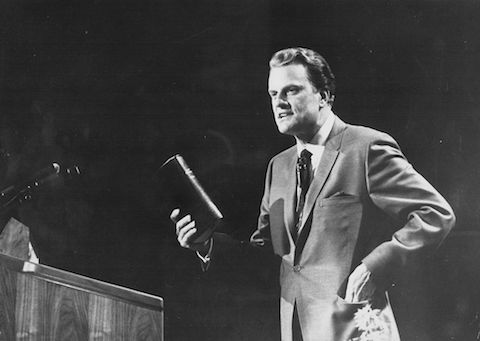
Billy Graham preaching.
A devastating war had ended only nine years before and food rationing was still in place in Britain. People were searching for meaning and security in their lives. A crowd of 120,000 gathered at the stadium in north London, many of them spilling on to the pitch. During the three-month crusade attendances topped 1.5 million, and 38,000 people responded to Billy Graham’s invitation to come forward to accept Jesus Christ as their saviour. My mother was one of them.
It was quite something to witness the power of those meetings, as you can today if you watch the footage on the internet. Throughout his career Billy Graham was one of the western world’s most commanding, charismatic evangelical figures. He was the Southern Baptist minister who achieved the status of a rock star, reaching a core band of followers made up of middle-class, conservative Protestants. Throughout his ministry, Billy Graham conducted more than 400 crusades in 185 countries and territories.
My mother, Wyn Reading, aged 27 at the time, returned home from Wembley a changed woman and therefore she changed my life too. The Church became a central part of our lives. I was six at the time. While some people saw Billy Graham as a manipulative Yankee spellbinder, my mother and her friends rejoiced in having seen the light. For the next 11 years, she was a live wire at her local church, St Francis in Beckingham Road, Guildford, attending services twice every Sunday and getting involved in any social events that were going.
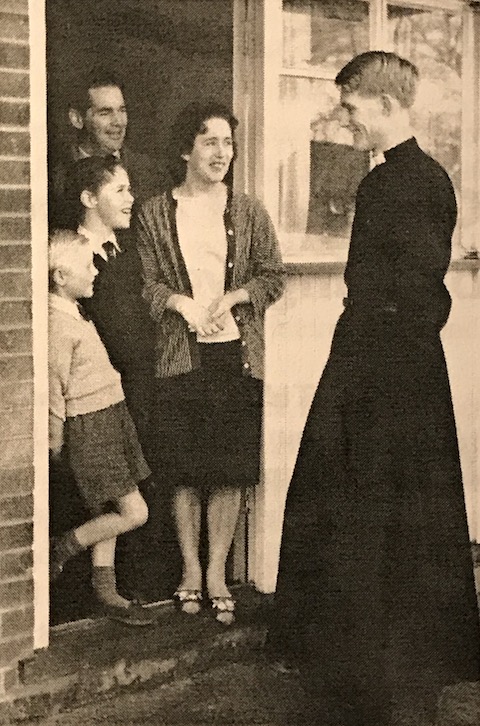
The Revd Paul Barber when he was the curate at St Francis’ Church, Westborough. Here he talks to the Parker family in Park Barn.
In the early 1960s, when famine tore through parts of Africa, a powerful sermon by the curate, the Revd Paul Barber, inspired her and her friends to reflect on their own relatively comfortable lives. I remember our family eating a plain sandwich lunch instead of roast beef three Sundays in a row, and handing over the money we saved to War on Want.
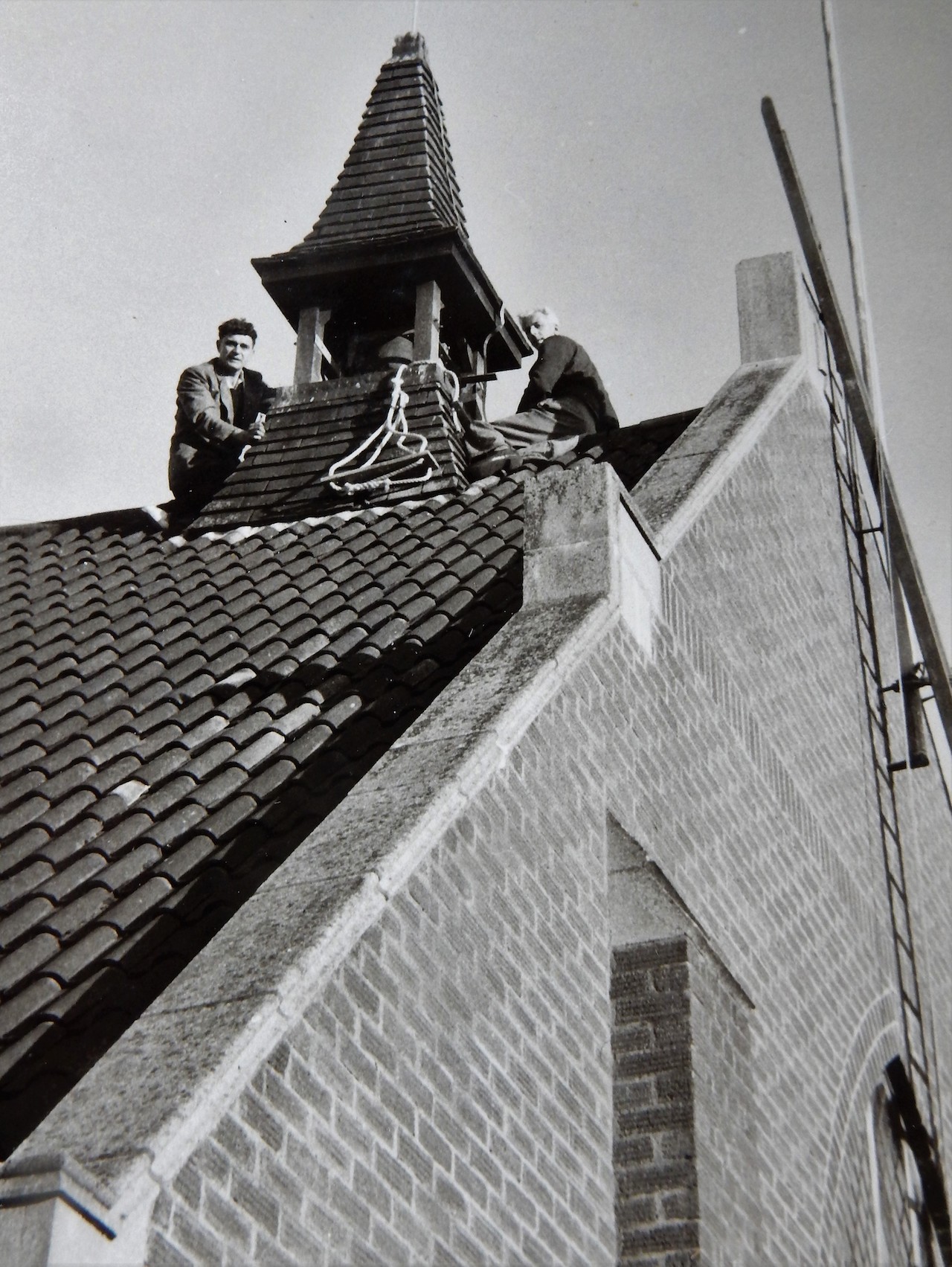
Midleton Road residents Ron Reading and Colin Hopper repairing the roof of St Francis’ Church. Click to enlarge in a new window.
My father remained an atheist until the end of his life – the stories narrated in the Bible were too far-fetched for such a practical man – but he accepted my mother’s religious enthusiasm with no complaints. When the church roof needed fixing he volunteered to lend a hand; when the old lady across the street couldn’t get to evensong, he was there to give her a lift.
Why did Billy Graham have such a powerful impact on my mother and thousands of other people at this time? My mother suffered from persistent anxiety and this may well have been a factor in her susceptibility to the message of hope promoted by Billy Graham.
And in the early 1950s there was plenty to worry about. This was a time of uncertainty. The Second World War and the Nazi threat to the British way of life still held vivid memories and now the spectre of nuclear annihilation hung over the world. The Korean War had put the Soviet Union on a collision course with the West. Communism had taken the place of Nazism as the new threat – ‘the Red Menace’. Early in 1954, the USA had conducted a landmark thermo-nuclear test on Bikini Atoll in the Pacific.
More important, perhaps, were threats that were more direct, more personal. Quite apart from the economic uncertainty, people lived in fear of two different diseases that were now being reported on the radio. First there was the growing threat from the infectious viral disease poliomyelitis, colloquially known as “infantile paralysis” because it primarily affected children.
Infection could be mild and temporary, but sometimes the virus would invade a person’s nervous system and the effects led to a range of debilitating problems, notably muscle paralysis. In the early 1950s the risk to our own family appeared small, but my mother worried all the same and there was a tendency for her anxiety to get out of proportion.
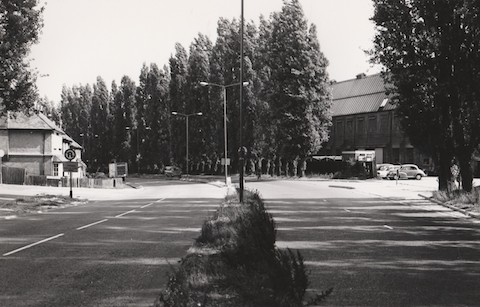
Midleton Road, Guildford was where David Reading and his family lived, opposite the Dennis Bros factory. This picture was taken by Graham Richings in 1977. Today the Woodbridge interchange roundabout is here – known locally as the Dennis roundabout.
The other disease that was beginning to make the news headlines was lung cancer. My mother and father were both heavy smokers at that time. In 1954 it was reported that a relationship between smoking and lung cancer had been all but proven. People were dying. The Health Minister, Ian Macleod, gave a warning against alarmist conclusions but the message was already out there. Even the word cancer was a kind of taboo; you whispered it because speaking it out loud gave it force.
Knowing my mother as an anxious and self-doubting woman, I would guess that she was desperately seeking security in an uncertain world. And here was a man who promised to provide it – Billy Graham, this mesmeric, six-foot tall American, an extraordinarily handsome man with a power in his voice that told people: Listen hard, this really is The Truth. He was seen as a man who could be trusted. He had accepted the Bible as the infallible world of God and now he was persuading others to do likewise.
Graham realised that the need for security was what was fuelling people’s search for spiritual answers and he used this as part of his pitch. In commanding tones, he told the Wembley congregation: “Our political and military leaders have said repeatedly, they do not know the answer to the present world dilemma. This uncertainty is beginning to penetrate to the man on the street. The average man must turn somewhere. He must have some faith and hope to hold onto. Thousands are turning to God and are finding peace and security, happiness and joy, in this age of uncertainty and confusion.”
Those could have been the words of a politician. In essence he was right, but had our political and military leaders really said those things? Although it was likely that the “man in the street” was in a state of alarm, how did he know that? Could he be really certain that those thousands who were “turning to God” were actually finding a lasting happiness? Had he asked them?
“I am convinced of one thing,” Billy Graham thundered. “That during the past few weeks we have seen an easing of world tension and I believe that one of the contributing factors to the easing of world tension and the prospects of an era of peace is the great spiritual awakening that we believe is taking place in many parts of the world.”
Unfortunately his confidence that world tension was easing was misplaced, as we have seen: the Cuban Missile Crisis 1962, the Six-Day War 1967, Yom Kippur 1973, the Soviet Invasion of Afghanistan 1979, the Gulf War 1990, the US-led invasion of Iraq 2003 – and so it goes on.
Each week our family played an active part in the life of the Church. Thankfully the old-style, grim-faced hell-and-damnation type of preaching was absent from St Francis’ Church.
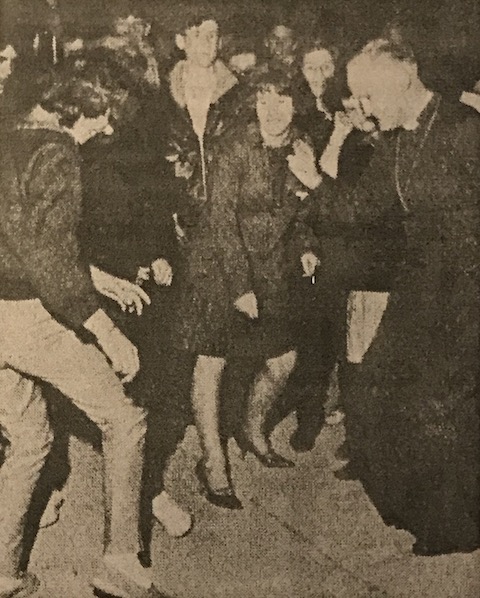
Pictured at a Westborough parish barbecue in 1962, the then Bishop of Guildford, the Rt Revd George Reindorp, dances the Twist with young people.
At least there was an attempt to move with the times and accept that the world was changing. When a church-goer wrote a letter to the local paper expressing outrage that the Bishop of Guildford had been photographed dancing the Twist at a social event, our vicar, the Revd Roy Trevivian, was having none of it.
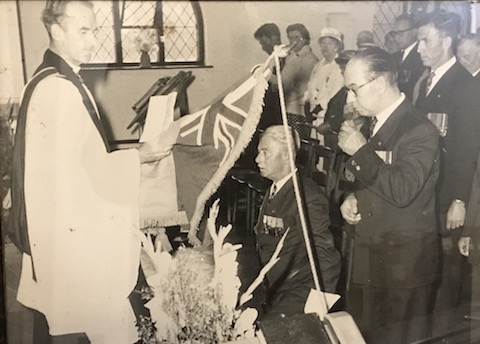
The Revd Roy Trevivian conducts a service at St Francis’ Church that includes members of the Stoughton and Westborough branch of the Royal British Legion.
“I’m fed up to the teeth with ‘dignified’ Christianity which has ended up convincing 90 per cent of the population that Christianity has nothing to do with them,” he wrote in response.
“This M— character talks about the holy office of the bishop demanding a certain dignity. I wonder how much dignity of his kind he would have found in that stinking stable in Bethlehem; as he watched a little boy running about the streets of Nazareth with patches on His trousers, sleeping rough under the hedges of Palestine; and when He was a Man finally being spat on by a jeering mob of respectable persons.”
The above is an extract from A Neurotic’s Search for Wisdom (unpublished), by David Reading. He would like to thank David Rose, whose book on the building of St Clare’s Church, Park Barn, Guildford, was among his sources.
Responses to Billy Graham, My Family and Memories of Westborough’s Church Community
Leave a Comment Cancel replyPlease see our comments policy. All comments are moderated and may take time to appear. Full names, or at least initial and surname, must be given.
Recent Articles
- Notice: Come and Make a Christmas Cracker
- Benefits of Assisted Living Scheme Outweigh Harm to Designated Landscape GBC Planners Decide
- Letter: Councillor’s Statement is Misleading
- Two Unitary Authorities, One Elected Mayor – Most Likely Devolution Outcome for Surrey
- Notice: Guildford Music Society Concerts at URC
- Letter: Our National Parties Need a Reality Check
- Can You Help Find Wanted Man?
- Letter: Will New Bridge Really Speed Up Journey Times?
- Surrey’s Annual Housing Target Now at 10,981 – Council Pleas Ignored
- Long Sentences for Sara’s Murderers as Judge Describes Her Treatment as ‘Torture’


Recent Comments
- Nigel Keane on Two Unitary Authorities, One Elected Mayor – Most Likely Devolution Outcome for Surrey
- Paul Robinson on Dumped E-bike Provokes Questions
- Tim Down on Letter: Will New Bridge Really Speed Up Journey Times?
- RWL Davies on Letter: Our National Parties Need a Reality Check
- Alan Judge on Dumped E-bike Provokes Questions
- Roland Dunster on Letter: Our National Parties Need a Reality Check
Search in Site
Media Gallery
Dragon Interview: Local Artist Leaves Her Mark At One of England’s Most Historic Buildings
January 21, 2023 / No Comment / Read MoreDragon Interview: Lib Dem Planning Chair: ‘Current Policy Doesn’t Work for Local People’
January 19, 2023 / No Comment / Read MoreA3 Tunnel in Guildford ‘Necessary’ for New Homes, Says Guildford’s MP
January 10, 2023 / No Comment / Read More‘Madness’ for London Road Scheme to Go Ahead Against ‘Huge Opposition’, Says SCC Leader
January 6, 2023 / No Comment / Read MoreCouncillor’s Son Starts Campaign for More Consultation on North Street Plan
December 30, 2022 / No Comment / Read MoreCounty Council Climbs Down Over London Road Works – Further ‘Engagement’ Period Announced
December 14, 2022 / No Comment / Read MoreDragon Interview: GBC Reaction to the Government’s Expected Decision to Relax Housing Targets
December 7, 2022 / No Comment / Read MoreHow Can Our Town Centre Businesses Recover? Watch the Shop Front Debate
May 18, 2020 / No Comment / Read More











Jane Hepburn
December 7, 2020 at 9:27 am
Really enjoyed this David. I grew up on Park Barn where my father was a doctor and helped build the church. Are you going to get the book published or do you have it in pdf?
Lynne Rosemary Enticknap
December 8, 2020 at 12:08 pm
I really hope David Reading does publish this in book form. I found the article fascinating.
David’s mother acted as my sponsor when I was confirmed at St Francis. Years later, after marriage and three children, Paul Barber, then Archdeacon of Surrey, preached at Dunsfold Church and I attended the service with my mother-in-law to hear him preach.
I had said I would not go back to the rectory for coffee as this wasn’t my scene. But on leaving the Church Rev’d Barber said, “I know you.” I gave him my married name. His reply was, “You were a Dale and lived in Deerbarn Road.” That was why he had invited us for a coffee.
I think at that time Roy Trevivian had died having left St Francis to live with and help the “down and outs” in London. I think he also did the morning radio, “Lift Up Your Hearts”.
Steve Pownall
December 13, 2020 at 10:44 am
Publish and be… (perhaps the wrong quote), but I’d be glad to see the rest of what David Reading has written.
The Rev’d Steve Pownall is the vicar at St Clare’s, Westborough